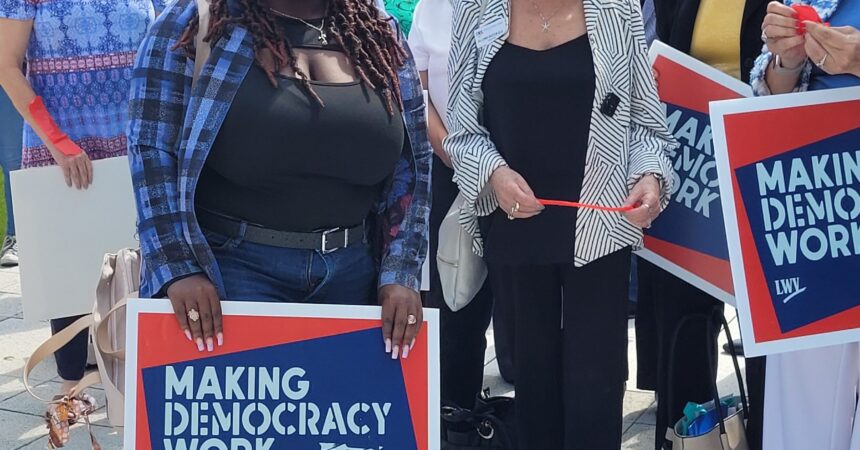
LWV calls on legislators to halt ‘onslaught’ on voting laws

Photo by St. Clair Murraine

Photo by St. Clair Murraine
By St. Clair Murraine
Outlook Staff Writer
Backed by four organizations that advocate for voting rights, the League of Women Voters called on legislators to stop current or proposed laws that make voters feel “muzzled.”
LWV’s state president Cecile Scoon spoke to reporters on the north plaza of the Capitol Complex last Wednesday, one day after legislators began their 60-day session. The organization questioned a list of bills that include ones that would change vote-by-mail practices, delay restoration of voting rights for former felons, consider revamping the state’s defamation laws, and amending the state Constitution to change school-board races from non-partisan to partisan.
The LWV has joined in suits filed against passage of some of these laws.
“Year after year, there has been an onslaught of laws to make voting more difficult,” said Scoon, the first Black president of the organization. “This land of the free, when you make voting more difficult, that is not increasing freedom. When you make it more difficult for lawful voters to vote, that does not increase the ability to vote.”
Scoon said the organization was also speaking out because there are several communities that need to know what they will encounter when they vote in 2024. Some of the changes, such as the ones in SB 90 that call for revising sections of the state’s election laws. Then, there is SB 524, which created the office of Election Crimes and Security.
Supporters of SB 90 said it is necessary to restore trust in the election system, following claim of irregularities after the 2020 election. That year, 4.8 million Floridians cast their votes by mail.
Olivia Babis, Senior Public Policy Analyst with Disability Rights Florida, was concerned about how portions of SB 90 would affect the disabled community. She was especially concerned about the requirement that calls for new signatures for obtaining mail-in ballots.
Signature mismatch is one of the biggest issues she saw, especially for someone with muscular disorders.
“They may sign differently every time they sign their names,” said Babis, who lives with a disability. “The way they sign their name at 8 o’clock in the morning doesn’t necessarily look like their signature in the afternoon.”
Scoon predicted that the vote-by-mail numbers will be affected despite a 2022 ruling by Judge Mark Walker. He issued a permanent injunction against the law’s restrictions on absentee ballot drop boxes.
“That is a direct harm to many, many communities,” Scoon said to the passage of those two bills.
Robert “Bobby” Block, Executive Director of Florida First Amendment Foundation, expressed concern that SB 991 would affect an individual’s rights to free speech. In part, the bill is an attack on journalism, Block said.
Rep. Alex Andrade, a Pensacola Republican who sponsors the bill, said the measure is a way for people who are harmed to get justice. Block disagreed.
It’s “a weaponized legal structure that’s meant to cow all speech into silence,” Block said. “It’s not about using the law to punish people for their opinions. I’m not just talking about liberal media. This will impact news media (and) social media. It will impact all of us. As a result, it’s a threat to our public discourse that sets us out from the rest of the world. BH 991 is a threat to everybody.”
Brad Ashwell, Florida State Director of All Voting is Local Action, called on legislators to “do no harm” during the current session.
“We need our state officials to stop listening to election conspiracy theorists,” he said.
HB 129 is another one that the LWV finds troubling. It will require a higher percentage of voters to pass a Constitutional amendment. Currently 60 percent gets an amendment passed but the legislation requires at least 66.67 percent of the voters to pass an amendment. This is the second time that the Republicans-led legislature is attempting to get it back on the ballot again after voters turned it down.
“This legislative session the Florida Legislature and governor will attack the civil rights and civil liberties of Floridians from all angles,” said Abdelilah Skhir, policy strategist with the American Civil Liberties Union Foundation. “That is their tactic; shock and awe.”
Skhir went on to call out lawmakers after Secretary of State Cord Byrd’s recent announcement that the state will leave the Electronic Registration Information Center, known as ERIC. ERIC is an agency that uses data to identify voters registered in more than one state, those who have moved between states and even people who have died.
Florida joined ERIC in 2019.
“The shockingly poor decision to leave ERIC directly harms the integrity of our voter roll,” Skhir said. “It was a decision that was made with zero basis in facts. It was a decision that was made after a coordinated pressure campaign from election deniers and conspiracy theorists. That is who has the ears of our state government.”







